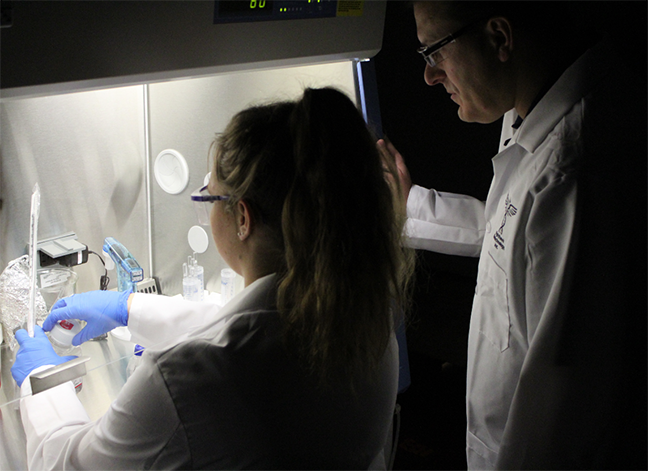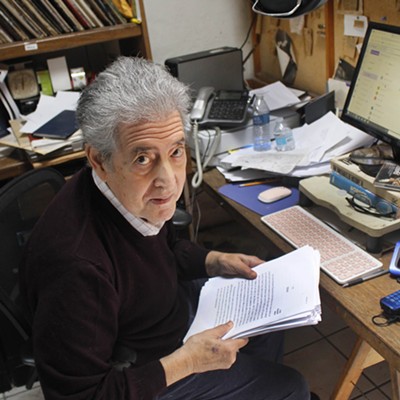Students at Ironwood Ridge High School have the unique opportunity to work at Nighthawk Biotechnology, Inc., which tackles real-world science, teaches students about the biotech industry and even offers university and career connections.
But Nighthawk Biotechnology, Inc. is not a real company, it's the name of Ironwood Ridge science teacher Mark Pincus's biotechnology class. By combining his real-world experience with a high school setting, Pincus helps form a classroom-to-career "pipeline" for local students.
"The program is enabling students to truly explore the sciences," Pincus said. "One of the keys is to let the students have real-world experience. They are being taught the way it's done in the industry."
As Pincus sees it, Nighthawk Biotechnology does not have a teacher and students; it has a supervisor and employees. The classroom contains a biosafety cabinet for handling delicate materials, an autoclave for sterilization, petri dishes, beakers, lab coats and many other objects typical of a professional laboratory. While the Amphitheater School District purchased much of the equipment, partnerships with local biotech companies like Icagen secured science materials for classroom projects.
"We're one of the only high schools in the nation where high school students are able to work with actual human cells," Pincus said. "You generally only work with those in university or graduate programs."
While IRHS has taught biotechnology since 2009, Pincus transformed the classes when he joined for the 2017 school year. Before becoming a teacher, Pincus worked in the pharmaceutical and biotechnology industries at organizations like Icagen and Aventis. He began teaching with an interest to inspire "the next generation of scientists."
Alongside classes like culinary arts and graphic design, Nighthawk Biotechnology is part of Amphi's Career and Technical Education program, which provides work-based experience and college credit. The Nighthawk Biotechnology class is also part of Pima County Joint Technical Education District, or Pima JTED, a county-wide network offering career experience to students in 14 public school districts.
In the two years Pincus has taught Biotechnology, the class size has increased, with roughly half the students continuing on from the biotech I to biotech II classes. Pincus also observed his class strengthen some of his students' decisions to pursue science careers.
"It's actually really nice to see our growth between the two classes," said IRHS senior Andrea Navarro, a student in biotechnology II. "It's something I'm really proud of. I'd say this class has definitely increased my love of science."
Oro Valley contains multiple biotechnology companies, including Aventis and Ventana Medical Systems. With local high schools teaching biotech courses, the University of Arizona offering in-depth biotech programs, and local companies hiring in the industry, students have the ability to follow this subject from school to work all within the Tucson area.
"Some kids might see forensic technology on TV, but biotechnology is almost never on their radar," said Dr. Nadja Anderson, director of the BIOTECH Project. "But once they experience it hands-on, they realize it's very applicable to their lives and for careers."
The BIOTECH Project is part of UA's BIO5 Institute and Department of Molecular & Cellular Biology. The BIOTECH Project, also part of Pima County JTED, has worked with more than 100,000 students and hundreds of teachers across Arizona.
The Project supports Arizona teachers in conducting DNA science lessons with their students, as well as hosts classroom visits to engage middle schoolers and high schoolers in the biotechnology sciences. In addition to classroom visits, the BIOTECH Project sells and loans hands-on biotechnology activities to teachers for their classrooms. These activities involve DNA fingerprinting, researching Sickle Cell Anemia, extracting DNA from fruit and more.
Andrew Lettes, Ph.D., teaches biotechnology at Pueblo Magnet High School, and facilitates the Pima JTED bioscience advisory board. Lettes has been instrumental in expanding CTE biotechnology programs to local schools; since Lettes first developed a biotechnology program at Pueblo High, ten other schools in the Tucson area have instituted similar biotechnology programs, according to Anderson.
"By definition, CTE classes are all about readiness," Lettes said. "Not only are we seeing these students selecting science majors, but in the labs, they're looked up to as leaders, because they have so much hands-on experience."
Lettes even takes his biotechnology classes on field trips to local biotech companies where his former students currently work. The classes also offer opportunities to job shadow at local biotech companies, as well as tour UA labs.
While Lettes feels there aren't enough jobs in this sector right out of high school CTE classes, he says the Pima County Regional Wastewater Reclamation Department provided a great opportunity for his students. In 2016, Workforce Development for Pima County saw there would soon be a need for wastewater operators, and offered a paid internship to Pueblo High CTE bioscience students.
"We have an industry that needs talented, motivated, educated workers." Lettes said. "And guess what, we have them right here at Pueblo High School."
Throughout the past decade, multiple other Tucson high schools have adapted bioscience career classes, including Canyon Del Oro, Catalina Foothills, Mountain View, Flowing Wells and more.
"The main mission is to bring real science experience to the classroom," Anderson said. "They are academic, hands-on programs, which are great for students. These kinds of programs really benefit Tucson."














